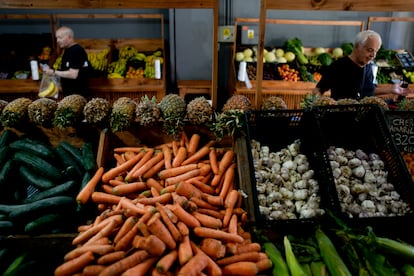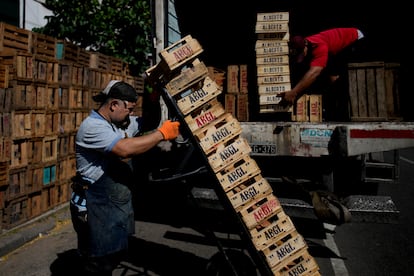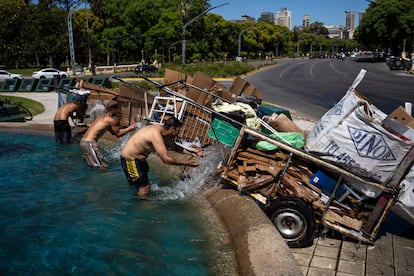Argentina’s Milei announces 50% currency devaluation and large cuts to public spending
The new government is simultaneously increasing social aid for food and child support to cushion the coming blow to people’s finances due to the reduction of subsidies for public transportation, electricity, gas and water


Argentina’s new president, Javier Milei, on Tuesday announced an official devaluation of the peso of 50%, virtually turning on the chainsaw that he famously used at campaign events. The government also announced it was canceling tenders for new public works projects, dismissing all government workers who have been in their posts for less than a year, a reduction of energy and transportation subsidies as of February, and a drastic reduction in the transfer of federal funds to the provinces. The far-right, populist president wants to slash some $20 billion in public spending and will do so as quickly as possible. “There is no money,” the Minister of Economy, Luis Caputo, reiterated as he announced the government’s first economic measures in a recorded message.
The official exchange rate went from 400 pesos to the dollar to 800, a sudden devaluation of 50%. This move puts an end to the fictitious value that the previous administration of Alberto Fernández sustained through multiple exchange restrictions, but it does not free the exchange market nor does it eliminate the gap with the alternative rates that coexist in Argentina, and which on occasion exceed 1,000 pesos to the dollar. The reaction of those exchange rates that function without state control will be seen on Wednesday.
A recession to contain prices?
Devaluing the currency in an economy that has been undergoing years of price and exchange controls without a simultaneous plan to contain price increases could turn out to be a very dangerous remedy. The plan assumes that it will be the economic recession, with the consequent collapse of consumer spending and slowdown by businesses, that will put a brake on price increases. So far, the escalation has accelerated since Monday, in anticipation of the economic measures promised by Milei.
Supermarkets and other food stores across the country, in anticipation of this measure, began changing their price tags earlier this week. In a butcher shop in the wealthy Buenos Aires neighborhood of Palermo, employees changed prices twice on Monday and raised them again on Tuesday by 25%. In other sectors, such as construction, suppliers have been making excuses to clients for more than a week to avoid selling them materials before knowing the new value of the official exchange rate.

Disorganized startup
The economic measures were going to be announced on Monday, but were later postponed until Tuesday. The message was recorded and scheduled to be broadcast at 5p.m. local time. The government sent a link to the website where it was going to be broadcast, but a few minutes after the announced time, the link stopped working. The recording was finally broadcast two hours late, at 7 p.m.
For the first 10 minutes, Minister Caputo gave a lesson on liberal economics. He attributed all of Argentina’s ills to its “addiction to the fiscal deficit,” that is to say, to spending more than it makes. He repeated the threat issued by Milei in his inaugural speech: if there is no drastic cut in public spending there could be hyperinflation of 15,000%. “Let’s imagine that milk goes from costing 400 pesos to costing 60,000 pesos in one year. Our mission is to avoid this catastrophe,” said the minister in his long introduction.
Caputo then announced a battery of 10 measures. In addition to the devaluation, the one that will have the greatest impact on the pockets of Argentines will be the reduction of subsidies for public transportation, electricity, gas and water. The purchasing power of many families has already plummeted since 2018, and facing these new expenses will not be easy. Many provinces are also going to be in trouble if they stop receiving national funds, another one of the announced cuts.
The plan also takes aim at government workers. Contracts of less than a year will not be renewed, and an exhaustive review of all contracts will be carried out. Public employment accounts for around 18% of Argentina’s total employment, although during the Covid-19 pandemic it rose to 20%, according to data from the Center for the Implementation of Public Policies for Equity and Growth (Cippec). This is a much higher percentage than in other countries in Latin America, such as Chile (12%) or Mexico (13%). In Argentina, the three administrations — national, provincial and municipal — add up to almost 3.5 million workers.

Additionally, government advertising will be cancelled for a period of one year. “There is no money for expenses that are not absolutely necessary,” insisted Caputo. According to his data, in 2023 this kind of advertising exceeded 30,000 million pesos (more than $75 million at the official exchange rate until yesterday).
As had already been anticipated, public works are being frozen: the state will not put out tenders for new projects and will not move forward with those that have already been awarded but have not yet begun. The objective is that from now on it will be the private sector that takes charge of construction, in a concession system similar to neighboring Chile.
Market reaction
Market confidence will be tested on Wednesday. In the meantime, the so-called “dollar blue,” dollar bills that are circulated informally at much higher exchange rates than the official one, was trading on Tuesday at 1,075 pesos to the dollar. If the gap between official and unofficial rates continues to expand, the devaluation will quickly lose its meaning.
The International Monetary Fund (IMF) welcomed the measures, saying they provide “a good foundation” for further discussions with Argentina about its debt with the institution. “These bold initial actions aim to significantly improve public finances in a manner that protects the most vulnerable in society and strengthen the foreign exchange regime,” said IMF spokesperson Julie Kozack in a statement. “Their decisive implementation will help stabilize the economy and set the basis for more sustainable and private-sector led growth.”
The Milei administration is portraying these measures as the only alternative to rebuild an impoverished country. The future, at least in the short term, looks bleak: the economy, stagnant for three months, will collapse in 2024. Argentina is suffering 142% annual inflation and four in 10 Argentines are impoverished. The president is promising that it will be a temporary sacrifice, for a maximum of two years.
Aware of the coming storm, the executive has promised to maintain the current aid to the most needy segments of the population and increase the budget allocations for two of its most popular programs: the Universal Child Allowance, the amount of which will be doubled, and the funds for the Alimentar food card, which will be raised by 50%.

Dialogue with China
The measures are intended to stabilize the economy and get the government through the first few months, especially until the first harvests begin in late March and export dollars from this sector, the most important in Argentina, begin to come in. Unlike the previous harvest, which was hit hard by the worst drought in the last 60 years, the rains of recent months guarantee that some $25 billion more will enter the country than in the previous season.
Many of Milei’s campaign promises have vanished, including his pledge of “not having ties with communist countries.” It has taken the president only 24 hours to try to mend the relationship with China, one of Argentina’s top lenders in recent years. On Monday he received a delegation from the Asian giant at the Casa Rosada, the seat of government, where he did everything possible to smooth over differences, and a day later he sent a letter to the Chinese president, Xi Jinping, to request the renewal of the currency exchange system with China and obtain the equivalent in yuan of $5 billion.
Argentina urgently needs foreign currency to face the upcoming maturities of the $44 billion debt it contracted with the IMF in 2018, under the presidency of Mauricio Macri. With the central bank’s reserves in the red, the currency swap with China was key in 2023 to comply with the payment schedule renegotiated with the IMF in 2021.
Sign up for our weekly newsletter to get more English-language news coverage from EL PAÍS USA Edition
Tu suscripción se está usando en otro dispositivo
¿Quieres añadir otro usuario a tu suscripción?
Si continúas leyendo en este dispositivo, no se podrá leer en el otro.
FlechaTu suscripción se está usando en otro dispositivo y solo puedes acceder a EL PAÍS desde un dispositivo a la vez.
Si quieres compartir tu cuenta, cambia tu suscripción a la modalidad Premium, así podrás añadir otro usuario. Cada uno accederá con su propia cuenta de email, lo que os permitirá personalizar vuestra experiencia en EL PAÍS.
¿Tienes una suscripción de empresa? Accede aquí para contratar más cuentas.
En el caso de no saber quién está usando tu cuenta, te recomendamos cambiar tu contraseña aquí.
Si decides continuar compartiendo tu cuenta, este mensaje se mostrará en tu dispositivo y en el de la otra persona que está usando tu cuenta de forma indefinida, afectando a tu experiencia de lectura. Puedes consultar aquí los términos y condiciones de la suscripción digital.








































